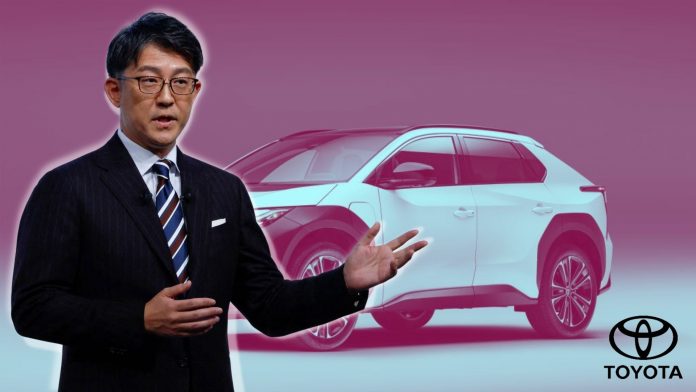Toyota’s new CEO is considering a factory floor remodel as it plans to transition to a new, dedicated platform for battery EVs after making significant changes to its executive team.
At his first briefing on March 31, Koji Sato confirmed an innovative EV architecture is being developed. Although it is unclear if the plan has been formally approved.
The world’s largest automaker is increasingly aware that it needs to match Tesla’s design in order to reduce production costs and transform its all-electric business into a higher margin one like its Silicon Valley competitor has done.
However, if adopted, the new EV platform would be the outcome of a thorough analysis of Toyota’s electric car plan carried out last year. Critics have since asserted that Toyota is long overdue for a shift.
When Sato took over as CEO on April 1, Akio Toyoda, the founder’s grandson, was still serving as CEO. Therefore, under his leadership, Toyota saw worldwide demand for battery EVs surpass its conservative projections.
According to Christopher Richte, a CLSA expert, “When Akio Toyoda was the CEO, some of the company’s statements implied that hybrid vehicles would be around eternally…” Adding “EVs must come first.” Investors and environmentalists have also been outspoken about the necessity for Toyota to act more quickly.
To illustrate, for Q3, Tesla outperformed Toyota in terms of profit per car by almost eight times, partly due to its capacity to streamline production and cut costs.
By 2030, it is anticipated that EV production will account for more than half of all vehicle production worldwide. For Toyota, meeting that desire will be crucial. It has so far fallen short with its first battery-powered EV, the bZ4X, Which had early recall issues and modest sales.
Toyota’s lack of battery electric models seems to be harming sales in the U.S., where EV growth is outpacing that of the overall market. General Motors saw an 18% increase in sales during Q1, which was helped by the increased demand for EVs from fleet and commercial customers, while Toyota recorded a nearly 9% decline.
While Toyota and its premium brand Lexus sold about 1,880 battery EVs during Q1, GM sold more than 20,000. Even though Toyota/Lexus sold just under 119,000 EVs in a total of mainly hybrids with a few battery electric and hydrogen vehicles that marked a decline of 10.7%.
Although, given the expansion of EVs across the U.S., Katherine Garcia, head of the Clean Transportation for All Campaign at the Sierra Club, asserted that if Toyota doesn’t pursue EVs under Sato, the company “will be leaving money on the table.”




